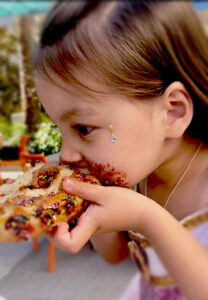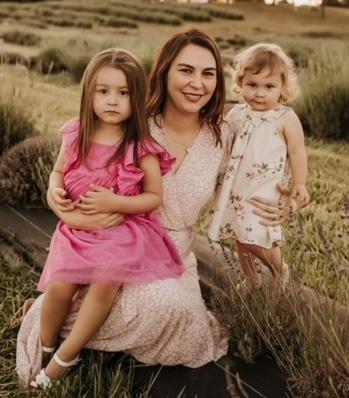Celebrate the EA/TEF Milestones, Especially the Doughnuts

Celebrate the EA/TEF milestones. This is the advice guest blogger Jennifer Forman has for other EA/TEF parents. In today’s post she describes the journey her family has had with their now 4-year-old daughter whose early years were made more difficult by the COVID pandemic.
It is late afternoon on a cool, fall day and I’m sitting next to my daughter’s incubator in the NICU while I search the internet looking for answers to understand her condition. I stumble across a support group of other parents who have children with the same birth defects. Hours pass as I read question after question and stories from other families going through the same journey. One mother posted a photo of her ten-year-old son eating a doughnut for breakfast. The caption was “It does get better.” This was a gut punch because in the moment all I could see was our current situation—our daughter on a ventilator being fed by TPN. I couldn’t comprehend her future or ever getting to the point of her eating solid food, let alone a doughnut.
Two days prior, my daughter was born with esophageal atresia (EA) with a tracheoesophageal fistula (TEF), ventricular septal defect (VSD), and hydronephrosis. This grouping of birth defects is known as VACTERL. My husband and I found out two weeks before she came into this world that she had a suspected fetal anomaly, but no parent can prepare for what was to come next. On day two of life, my daughter underwent her primary repair for the EA/TEF. Thankfully, her surgery and recovery were relatively uncomplicated, and we were discharged home two weeks later to start our journey.
Any EA/TEF parent will tell you the first two years are the hardest, and our experience proved that be true. When you are in it, it can feel overwhelming and suffocating to witness your child go through doctor visits and routine colds that can turn worse on a dime. To date, my daughter has undergone eight procedures including an emergency removal of a meatball that was lodged in her throat. We have seen countless specialists and therapists to help with her food delays.
All we could do was celebrate the EA/TEF milestones—when she finally weighed 6-lbs, sitting in the highchair, eating avocados and all the easily mashable foods. One of my daughter’s first victories came at 2 years old when she was able to eat everything safely at daycare. We no longer needed to pack a special lunch with “safe foods” for her.
Experiencing this during a global pandemic has not been easy. I couldn’t even count the number of times I have received comments from strangers about my daughter’s cough and I have to politely reply,
“No, she is not sick. That is her normal cough.”
My response is met with looks of judgment about my parenting skills usually followed by people keeping their distance so as not to catch her sickness. I have had people refuse to ride in elevators with us because of her cough.
My daughter is now four and has overcome so much in her short life. She is undoubtedly the strongest little girl I know. My advice to fellow EA/TEF parents is to always acknowledge the setbacks, but to celebrate the EA/TEF milestones, no matter how small. Your child will overcome many challenges you never thought possible—like eating a doughnut.

Do you like what you see at DifferentDream.com? You can receive more great content by subscribing to the monthly Different Dream newsletter and signing up for the daily RSS feed delivered to your email.
Heading Photo by Annie Spratt on Unsplash

By Jennifer Forman
Jennifer Forman lives in Michigan with her husband Mike and two children, Leila and Abby. Jennifer is a medical professional who has dedicated her career to oncology patients and anticancer treatments. She is an advocate for her EA/TEF daughter who has been her inspiration.
4 Comments
Submit a Comment
Subscribe for Updates from Jolene
Related Posts
Emotions Are Information: A New Way to View and Interpret Big Feelings
Jolene explains the revelation she had about interpreting feelings as a special needs parent: emotions are information.
We’re Proud of our Kids with Special Needs!
Guest blogger Steve Harris takes a time out to remind us how true it is that we’re proud of our kids with special needs.
A Song for Encouragement
Musician Steve Siler presents his song, “Whole in the Sight of God,” a song for encouragement of families impacted by disability.






I couldn’t have said it better myself!
You, s parents, were up to this work of love. Your daughter is vibrant an fun, intelligent and delightful’. Congratulations
We have all lived her journey. Plus she has no problems eating donuts. Gram Gram.
I understand EVERY word of this post!!!!! Our kids are strong and amazing. So are we!!!!!